
Cristian Antonelli
Professor
University of L’Aquila
Cristian ANTONELLI (CV here)
Homepage: https://dsfc.univaq.it/it/professori-associati/82-antonelli-cristian.html
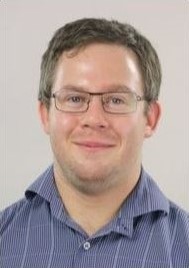
Thomas Bradley
Senior Reearcher
Eindhoven University of Technology
Thomas BRADLEY is a senior researcher in the High Capacity Optical Transmission Lab of the Electro-Optical Communications Group at the Institute for Photonics Integration, TU/e. His current research lies in two key areas of fibre optic sensing and quantum communications. The development of novel optical fibres and fibre post processing techniques can be exploited to support novel optical fibre sensors and advances in quantum communications. He has authored and co-authored several high impact publications in Nature Photonics, Optics Express and has several prestigious post deadline papers at leading optical communications conferences.
Homepage: https://research.tue.nl/en/persons/tom-bradley

Andrea Carena
Full Professor
Politecnico di Torino
Andrea CARENA is Full Professor in the Optical Communication Group of Dipartimento di Elettronica e Telecomunicazioni at Politecnico di Torino, Italy. He received the M.Sc. and Ph.D. degrees in electronic engineering from Politecnico di Torino, Torino, Italy, in 1995 and 1998, respectively. In 1998, he was a Visiting Researcher with the Optical Communication and Photonic Network Group, University of California, Santa Barbara, CA, USA, directed by Prof. Blumenthal working in the realization of OPERA, an optical label swapping network testbed. From 2004 to 2014, he was an Assistant Professor with Politecnico di Torino. He collaborated in the development and implementation of OptSim, an optical transmission system simulator. He is currently an Associate Professor at the Optical Communication Group, Dipartimento di Elettronica e Telecomunicazioni, Politecnico di Torino. His research interests include physical layer design optical communication systems: coherently detected systems, digital coherent receiver design, digital signal processing techniques for advanced modulation formats, digital nonlinearity mitigation, Nyquist-WDM for Terabit Superchannel implementation, algorithm for computer simulation of fiber propagation, and a particular emphasis on fiber nonlinearities modeling. He co-authored more than 200 scientific publications. In 2014 and 2015, he received the IEEE/OSA “JOURNAL OF LIGHTWAVE TECHNOLOGY” Best Paper Award.
Homepage: https://optcom.polito.it/people/associate-professor/andrea-carena
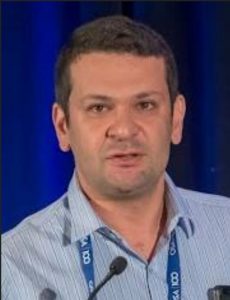
Stanislav Derevyanko
Associate Professor
Ben Gurion University
Stanislav (Stas) DEREVYANKO is a theoretical physicist by training and has spent most of his career looking at nonlinear and/or disordered systems. From high energy beams scattering in a disordered medium to Shannon informational capacity of the modern day optical fibre communications scientists and engineers have to look at and describe the systems that are affected both by nonlinearity and noise. While the area of high power and high signal-to-noise ratio is studied by the nonlinear physics (with many achievements to its credit) the opposite limit deals with fully disordered systems and/or incoherent pulses and is the subject of the general theory of disordered systems. The grey area in between, when both signal and noise contribute equally to the dynamics of the system remains one of the main challenges for both physicists and engineers.
Most of his current research activities deal with the interplay of nonlinearity and disorder in one way or another. From optical telecommunications to thermalization in coupled waveguides and from information theory to machine learning – they all have one thing in common: they are enormous fun!
Homepage: https://wwwee.ee.bgu.ac.il/~stasd/

Marija Furdek
Assistant Professor
Chalmers University of Technology
Marija Furdek works in the research unit Optical Networks. Her expertise lies in optical network design and optimization, with an emphasis on physical-layer security and resilience. She strives to develop secure, cognitive and autonomous communication networks. As (co)PI and WP/task leader, Marija participated in several Swedish and international scientific projects with collaborators from industry and academia. She co-authored 90+ scientific publications in international journals and conferences, 5 of which received best paper awards. She is a Senior Member of IEEE and OSA
Homepage: https://www.chalmers.se/en/staff/Pages/Marija-Furdek-Prekratic.aspx
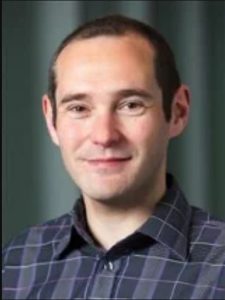
Michael Galili
Associate Professor
Technical University of Denmark
Michael GALILI Michael Galili (Member, IEEE) was born in Aabenraa, Denmark, in 1977. He received the M.Sc. degree (Eng.) in applied physics from the Technical University of Denmark (DTU), Kgs. Lyngby, Denmark, in 2003 and the Ph.D. degree in optical communications and signal processing from DTU Fotonik in 2007. He is currently an Associate Professor and Scientific Coordinator with the Research Center Silicon Photonics for Optical Communication (SPOC). He is the author or coauthor of more than 300 peer-reviewed journal and conference publications and he is teaching and supervising students at bachelor’s, master’s, and Ph.D. level. His research interests include optical transmission and signal processing for telecommunication, nonlinear integrated devices for optical processing and advanced optical switches for datacom systems.
Homepage: https://orbit.dtu.dk/en/persons/michael-galili
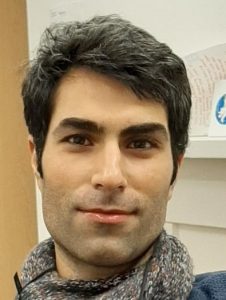
Morteza Kamalian-Kopae
Researcher Fellow
Aston University
Morteza KAMALIAN-KOPAE received his BSc in electrical engineering from Isfahan University of Technology, Isfahan, Iran, his MSc in communication engineering from Yazd University, Yazd, Iran, and his PhD in electrical engineering from Aston University, Birmingham, UK. Since graduation, he has been with Aston Institute of Photonic Technologies (AIPT) as a research fellow working on nonlinear Fourier transform, in particular, for periodic solutions of the nonlinear Schrödinger equation. His research interests include signal processing in optical communication, analysis of nonlinear dynamics, and wireless communication systems
Homepage: https://www.linkedin.com/in/morteza-kamalian-kopae-021a4a11a/

Boris Karanov
Research Fellow
Eindhoven University of Technology
Boris KARANOV is a post-doctoral research member of the Signal Processing Systems Group at the Eindhoven University of Technology with research focused on the application of deep learning for digital signal processing in optical fibre communications. He received the B.Sc. degree in telecommunication engineering from Technical University of Sofia, Sofia, Bulgaria, in 2014, and the joint M.Sc. degrees in photonic networks engineering from Aston University, Birmingham, U.K.; Osaka University, Osaka, Japan; and Technical University of Berlin, Berlin, Germany, in 2016, under the Erasmus Mundus Masters framework. His master thesis was developed in Fraunhofer Heinrich-Hertz-Institute, Germany. During the B.Sc. and M.Sc. programmes, he had internships in the Bulgarian Academy of Sciences and Mitsubishi Electric, Japan and worked under MC-IRSES scheme with Jiaotong University, Shanghai, China. His Ph.D. programme (2016-2020) was with the Optical Networks Group, University College London, London, U.K., and Nokia Bell Labs, Stuttgart, Germany under the European Industrial Doctorate (EID) Marie Skłodowska-Curie project Coding for Optical communications In the Nonlinear regime (COIN). His Ph.D. research focused on developing new coding and detection methods for communication over the nonlinear dispersive optical fibre channel using deep learning. In 2018, Boris was a recepient of the Nokia “Most innovative AI solution” award for pioneering work in the field of machine learning applications to communication systems. In 2021, he received the “Best paper award” from the IEEE/OSA Journal of Lightwave Technology, honouring the most influential, highest-cited paper published two to three years prior to the award. Also in 2021, he was awarded the Lombardi prize from the Electronic and Electrical Engineering department at UCL, given annually to the best, most impactful thesis submitted in the previous year.
Homepage: https://research.tue.nl/en/persons/boris-karanov

Alan PT Lau
Professor
The Hong Kong Polytechnic University
Alan PT LAU received his B.A.Sc in Engineering Science (Electrical Option) and M.A.Sc. in Electrical and Computer Engineering from University of Toronto in 2003 and 2004 respectively. He obtained his Ph.D. in Electrical Engineering at Stanford University in 2008 and has joined the Hong Kong Polytechnic University where he is now an Associate Professor. His research covers system characterization, performance monitoring, digital signal processing and machine learning applications of various optical communication systems and networks. He collaborates extensively with Industry and serves in technical program committees of major conferences in Optical Communications.
Homepage: https://www.linkedin.com/in/alan-pak-tao-lau-9b995826
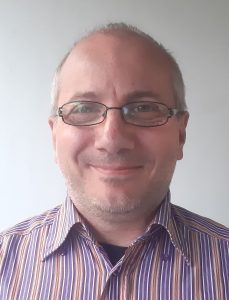
Antonio Napoli
Infinera Germany
Antonio NAPOLI received his Ph.D. degree from the Politecnico di Torino with a thesis on “Electronic equalization for advanced modulation formats”. Since 2006 he joined the R&D of Siemens COM, where he was initially working on EDFA transient suppression for long and ultra-long-haul optical networks. In 2007, he became a member of the established joint venture between Nokia and Siemens, named Nokia Siemens Networks, where he was working on cutting-edge projects on robust and tolerant design of optical communications systems at 100 Gb/s and 400 Gb/s. In particular, he was involved in the design and development of future DSP-based coherent receivers for next-generation optical communication systems. In 2013, he joined Coriant, where he has been involved in EU project working on data plane activities, such as for example in the EU FP-7 IDEALIST project. From Oct. 1st 2018, he is with Infinera. His research interests include DSP for optical bandwidth variable transponders from metro to long-haul network receivers, advanced modulation techniques, and wideband optical system design and modelling.
Homepage: https://sites.google.com/site/antonionapolipub
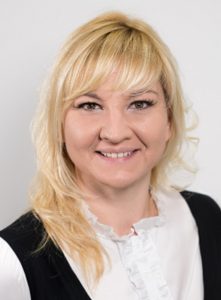
Jelena Pesic
Nokia
Jelena PESIC received a Ph.D. in Optical Networks from the University of South Brittany in collaboration with France Telecom–Orange Labs, France, in 2012. She received a best paper award at the IEEE ONDM conference in 2011. After her PhD Jelena joint Telecom Bretange as Post-doctoral Research Engineer and later INRIA, where she worked on the European project SASER. After moving to Alcatel–Lucent (now Nokia) Bell Labs in 2014, she focused on dynamic elastic networks dimensioning and techno-economic studies. Her main areas of research interest include intelligent optical networks, including core and metro networks. Jelena was selected OSA Ambassador in 2018.
She is currently working at Nokia as Systems Integration Specialist, with ION IP Optical Networks WDM technical expertise on the basis of the Nokia IP Transport product portfolio.
Homepage: https://www.linkedin.com/in/jelena-pesic-85b61423/

Marc Ruiz
Postdoctoral Resarch Fellow
Universitat Politècnica de Catalunya
Marc RUIZ received the M.Sc. degree in Statistics and Operations Research in 2009 from the Universitat Politecnica de Catalunya (UPC). In 2009 he joined the Advanced Broadband Communications Center (CCABA) to start his pre-doctoral research, receiving the PhD degree (with honors) in Computer Science in 2012 from the Computers Architecture Department (DAC) at UPC. He is currently working as a post doctoral researcher with the CCABA. His research interests include optimization and data analytics for next generation 5G networks. He has developed part of his work in the framework of past FP-7 European research projects such as DICONET, STRONGEST, IDEALIST, and GÉANT. Currently, he is working on the H2020 5G-PPP METRO-HAUL project, covering several topics on network planning and data analytics for metro optical networks. Moreover, he has participated in various national funded projects.
Homepage: https://personals.ac.upc.edu/mruiz/

Laurent Schmalen
Professor
Karlsruhe Institute of Technology
Laurent SCHMALEN is a full professor at Karlsruhe Institute of Technology (KIT) in Karlsruhe, Germany, where he heads the Communications Engineering Lab (CEL). From 2011 to 2019, he was a member of technical staff and department head at Nokia Bell Labs in Stuttgart, Germany. He joined Bell Labs after receiving his Ph.D. from RWTH Aachen University in Aachen, Germany. His research topics include forward error correction algorithms and digital coded modulation schemes for high-speed optical communications. He received multiple awards for his research work, including the 2016 Journal of Lightwave Technology Best Paper Award, has more than 120 publications in journal and conference papers, has co-authored 4 book chapters and holds several patents.
Home page: http://www.cel.kit.edu/team_schmalen.php
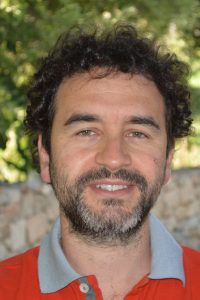
Marco Secondini
Associate Professor
Scuola Superiore Sant’Anna
Marco SECONDINI received the M.S. degree in Electrical Engineering from the University of Roma Tre, Rome, Italy, in 2000, and the Ph.D. degree from Scuola Superiore Sant’Anna, Pisa, Italy, in 2006. In 2005, he was a Visiting Faculty Research Assistant with the Photonics Group, University of Maryland Baltimore County, Baltimore, USA. Since 2007, he has been with Scuola Superiore Sant’Anna, where he currently serves as an Associate Professor of Telecommunications. He also collaborates with the Photonic Networks & Technologies National Lab of the CNIT in Pisa. He served in the technical program committees of the Optical Fiber Communication Conference (OFC), the European Conference of Optical Communication (ECOC), the Asia Communications and Photonics Conference (ACP), the Global Communications Conference (GLOBECOM), and the International Conference on Communications (ICC). He currently serves as an Associate Editor for IEEE Transactions on Communications. His research interests are in the area of optical fiber communications, with a special focus on information theoretical aspects, modulation and detection techniques, and fiber nonlinearity modelling. In this area, he has coauthored more than 120 papers in leading journals and conferences.
Homepage: https://www.santannapisa.it/en/marco-secondini

Mehran Soltani
PhD student
Technical University of Denmark
Mehran SOLTANI received his B.Sc. and M.Sc. degrees in electrical engineering, communications systems from Amirkabir University of Technology (Tehran Polytechnic), Tehran, Iran in 2017 and 2020, respectively. His M.Sc. thesis was entitled “Learning-based Estimation and Detection in OFDM Systems”, addressing deep learning methods for channel estimation and signal detection in OFDM systems. As a Ph.D. student, he joined the Machine Learning in Photonic systems group at the Department of Photonics Engineering, Technical University of Denmark (DTU Fotonik), in July 2020, with the supervision of Prof. Darko Zibar. Currently, his Ph.D. focuses on signal power evolution design using machine learning-based Raman amplification. His research interests include machine learning and signal processing applied to optical and wireless communication systems.
Homepage: https://www.linkedin.com/in/mehran-soltani-b87bbba6/
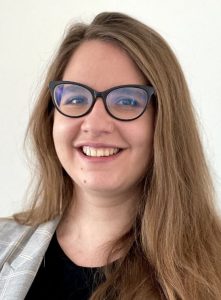
Anastasiia Vasylchenkova
Leverhulme Trust Research Fellow
University College London
Anastasiia VASYLCHENKOVA Anastasiia Vasylchenkova is currently a Leverhulme Trust Research Fellow in Optical Networks Group at University College London, running a research project on the analytical modelling of ultrawideband optical communication. She received her BSc and MSc in nuclear physics from Kharkiv National University, Ukraine in 2014 and 2016, respectively.
She received a PhD degree from Aston University, Birmingham, UK, for her research within the nonlinear Fourier transform approach for optical communications. Her research interests include fibre optics, nonlinearity mitigation, analytical modelling and transmission system design.
Anastasiia is an experienced educator in STEM, educational events manager and designer, Fellow of the Higher Educational Academy. She is holding the role of the President International Physicists’ Tournament, leading the work of the executive team. Beyond this, she has 10 years of volunteering experience for STEM and photonics communities, including engagement through SPIE, IEEE, and OSA. She is a Committee Member and Publicity Officer of the IEEE Photonics UK and Ireland Photonics Chapter, and a Chair-elect of the OSA Optical Communication Technical Group.
Homepage: https://www.linkedin.com/in/anastasiia-vasylchenkova/
Google Scholar
Scopus

Sander Wahls
Associate Professor
Delft University of Technology
Sander WAHLS received a Diplom degree in mathematics from TU Berlin in 2007, and a doctorate in electrical engineering (summa cum laude) from the same university in 2011. He is currently an associate professor with ius promovendi at the Delft Center for Systems & Control at TU Delft. Before joining TU Delft in 2014, Sander spent two years as a Postdoctoral Research Fellow in the Department of Electrical Engineering at Princeton University. His research is focused on system theory and signal processing for nonlinear systems, currently in the areas of integrable systems, nonlinear Fourier transforms and their application in engineering problems. He received the 2015 Johann-Philipp-Reis Award for his work on fast nonlinear Fourier transforms. In 2016, the European Research Council (ERC) awarded him a Starting Grant on the same topic. Since 2021, he is serving on the ECOC Subcommittee “Techniques for digitally enhancing optical communication”. He is a Senior Member of the IEEE.
Homepage: https://www.dcsc.tudelft.nl/~swahls/
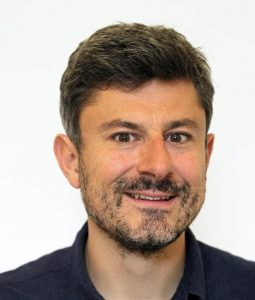
Darko Zibar
Professor
Technical University of Denmark
Darko ZIBAR is Professor at the Department of Photonics Engineering, Technical University of Denmark and the group leader of Machine Learning in Photonics Systems (M-LiPS) group. He received M.Sc. degree in telecommunication and the Ph.D. degree in optical communications from the Technical University of Denmark, in 2004 and 2007, respectively. He has been on several occasions (2006, 2008 and 2019) visiting researcher with the Optoelectronic Research Group led by Prof. John E. Bowers at the University of California, Santa Barbara, (UCSB). At UCSB, he has been working on topics ranging from analog and digital demodulation techniques for microwave photonics links and machine learning enabled ultra-sensitive laser phase noise measurements techniques. In 2009, he was a visiting researcher with Nokia-Siemens Networks, working on clock recovery techniques for 112 Gb/s polarization multiplexed optical communication systems. In 2018, he was visiting Professor with Optical Communication (Prof. Andrea Carena, OptCom) group, Dipartimento di Elettronica e Telecomunicazioni, Politecnico di Torino working on the topic of machine learning based Raman amplifier design. His resrearch efforts are currently focused on the application of machine learning technqiues to advance classical and quantum optical communication and measurement systems. Some of his major scientific contributions include: record capacity hybrid optical-wireless link (2011), record sensitive optical phase noise measurement technique that approaches the quantum limit (2019) and design of ultrawide band arbitrary gain Raman amplifier (2019). He is a recipient of Best Student paper award at Microwave Photonics Conference (2006), Villum Young Investigator Programme (2012), Young Researcher Award by University of Erlangen-Nurnberg (2016) and European Research Council (ERC) Consolidator Grant (2017). Finally, he was a part of the team that won the HORIZON 2020 prize for breaking the optical transmission barriers (2016).
LinkedIn: https://www.linkedin.com/in/darko-zibar-1779b73